Martin Edwards's Blog, page 49
December 7, 2022
Cambridge and the Golden Age

I'm just back from a very enjoyable trip to Cambridge. When Sophie Hannah asked me to give a lecture on Golden Age detective fiction to a group of her students who are studying creative writing with an emphasis on crime, I needed no more than a nanosecond to make up my mind to accept her invitation. And I'm so glad I did.
The venue was Madingley Hall, a very impressive place which dates back to the sixteenth century. Since 1948, it's been owned by Cambridge University and it makes an excellent venue for all kinds of continuing education courses and other events. I was able to stay overnight and enjoy the excellent dining facilities. As far as I know, Oxford doesn't have anything comparable, and it's certainly a great draw for the students.
Each time I'm asked to talk about the Golden Age, I try to do something slightly different. This keeps me fresh and avoids the risk of the material becoming stale. Often, I bring along 'props' or visual aids, examples of books from the period, and one of the items the students were especially interested in was an original copy of Who Killed Robert Prentice?, which was the second of the Dennis Wheatley-Joe Links crime dossiers.
It was great fun to catch up with Sophie, who is one of the most interesting thinkers in the genre and who devised the creative writing course herself. After the lecture there was an opportunity to relax over a drink in the bar with some of the students. They were a delightful bunch of people and I was impressed by their enthusiasm. I hope to have a chance to read some of their novels in years to come.

December 5, 2022
A Factotum in the Book Trade - review
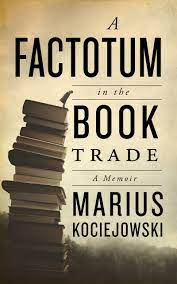
I've met quite a lot of bookdealers but I've never come across Marius Kociejowski, and given that he's retired from the business and wasn't much involved with crime books when he was, I suppose it's unlikely that I ever will. That's a pity, because on the evidence of his recently published memoir, A Factotum in the Book Trade (published by Biblioasis, a Canadian literary press), he's a very interesting chap, someone from whom I reckon I could learn a lot. His book certainly made quite a strong impression on me.
The first thing to say is that I really enjoyed (and gained from) reading it, so much so that I've listened to an interview with Marius and a podcast in which he discusses the book. So when I criticise the book's flaws, please bear in mind that it's only because I think that, with more work, this could have been an absolute masterpiece rather than a marvellous but maddening mix of the brilliant and - it must be said - the banal. An editor is acknowledged at the end, but to be honest, there's minimal evidence of a strong editorial hand. The result is something highly idiosyncratic - or to put it another way, a curate's egg.
There's no real structure to the book. It's a collection of bits and pieces, written during the pandemic and gives the impression of being thrown together in a rush. Now I like discursive writing with plenty of digressions, as anyone who has read The Golden Age of Murder will know, but there has to be a limit to self-indulgence, because writers should respect their readers. Given the defiant refusal to bother with a narrative arc, the absence of an index is baffling. Like Marius, I love books, but I suspect that writing books appeals less to him than it does to me.
Some of the personalised criticisms that pepper the book are unsettling, even though I don't know the people he targets. I sense from his interviews that Marius realises that he overdid things in that respect and I'm sure he's a kinder guy in person than he sometimes appears to be in print. He believes in being honest, but sometimes there's a subjectivity to his blunt opinions that doesn't work for me. It's also a bit odd, as one interviewer pointed out, to write a highly personal memoir that guards one's privacy quite as zealously as this one does. I'm all in favour of protecting personal privacy, but the approach in this case is reminiscent of the have-your-cake-and-eat-it style of the kind of politician he deplores.
The flaws are such a pity because there are wonderfully witty lines (and anecdotes) in this memoir, as well as, I would argue, quite a lot of wisdom and many insights that I find thought-provoking. Perhaps he overdoes the melancholy about the loss of so many bookshops from the high streets. Many of us share his dismay about what has happened, but life always moves on and real books continue to be loved across the world.
Apparently Marius is a poet (and a travel writer) and there's a fine quality to some of the writing that impressed me a great deal. So did his emphasis on ethics in book dealing, though again his criticisms of one or two fellow dealers seemed harsh. Above all, I found it instructive to read a very personal account of one person's passion for the book trade. It's a book that, warts and all, deserves to be a success.
December 2, 2022
Forgotten Book - When the Devil Was Sick
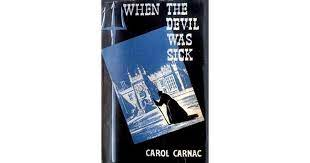
Until a few years ago, as a reader I focused on the books that Carol Rivett wrote under her most prominent pen-name, E.C.R. Lorac, rather than those which appeared under the name Carol Carnac. One of the reasons was that the Carnac books tend to be very elusive. However, I was lucky enough to acquire an inscribed dedication copy of Crossed Skis and, although I'm not interested in ski-ing, I enjoyed the novel.
Some time later, I was delighted when the British Library agreed to publish Crossed Skis as a Crime Classic and positive reader reaction duly followed. Of course, this author was highly prolific under both names and not all the books can appear as Crime Classics, but excellent sales figures mean that it's likely that Lorac/Carnac titles will continue to be reprinted. Meanwhile, I've been reading a shelf-full of them.
Among them is an obscure Carnac mystery - the fourth to appear under that name - with the odd title When the Devil Was Sick. (The title comes, it seems, from an old phrase that I must admit I hadn't encountered before). It's a country house mystery, but with quite a bit of the atmospheric description of rural settings that was a hallmark of this writer. The detection is done by Inspector Charles Ryvett (a surname obviously based on Carol's own real name, suggesting that she had quite a high level of identification with this particular character).
Strange events on Lammas Night culminate in the murder of a mysterious man dressed up as monk. Is he a member of the family in whose mansion he is discovered? The butler is among those who knows more than he is willing to reveal to Ryvett. A very unusual feature of this novel, especially for one written in the Golden Age by a woman, is that amateur boxing plays a part in the storyline. Ryvett is an appealing character and this interesting story is one of a number of Carnac titles which I think deserve a new life in the twenty-first century.
November 30, 2022
Exciting Times

I was amused yesterday when the BBC announced a 'stellar line-up' of festive television, only to include the above photo in connection with a piece about this year's Christmas University Challenge. My lips remain sealed about what actually happened, but suffice to say that for me it was a 'bucket list' moment, to appear on a programme that I've watched since I was a small boy. And to be captain of Balliol...well, it was marvellous, although daunting.
When the famous theme music is played and you look at Jeremy Paxman and realise your ignorance is about to be exposed to the nation, and there's no escape, it really is quite something. We appeared in the very first heat (there were seven heats involving fourteen teams, then the semi-finals involving the four highest-scoring winners and final - 10 days of telly in all). I gather that heat will be screened on 19 December and that the series then runs for two weeks, Monday to Friday each week. A treat for connoisseurs of facial expressions of bafflement! I'll talk in more detail about this amazing experience another time.
In fact, this has been one of a number of memorable experiences that I've had lately. One, which involves an audio drama I've written and which was recorded last week, again I'll talk about when the time is right. I'm also undertaking some other projects which, in one way or another, amount to breaking fresh ground. I've also had a few late This is exciting for a writer, and gives you the energy and enthusiasm you need to keep writing - and above all, to keep writing different types of material.
Reviews of The Life of Crime continue to come in. Ellery Queen's Mystery Magazine says it surpasses previous histories of the genre and 'manages to be both vast in scope and profound in thought, all the while hard to put down' while the book also had great reviews in the Daily Mirror and Daily Express and the Spectator chose it as one of the 'books of the year'.
Meanwhile I continue to take part in a range of events. Last night I took part, alongside two American academics, in the National Association of Scholars' discussion about The Maltese Falcon (now available on YouTube) and tomorrow I'm giving a talk at Rhyl Library. I'm being interviewed for the Doings of Doyle podcast on Sunday and next week I'll be at Cambridge University, giving a lecture on Golden Age fiction to a group of students participating in Sophie Hannah's crime writing course. Then it's off to Oundle Literature Festival for my final event of the year. This kind of variety appeals to me a great deal.
I've mentioned before that I find writing short stories very rewarding and yesterday I sent off two new ones, both destined for American anthologies if the editors like them and feel they fit the requirements of the anthologies in question. And right now I'm about to start work on another short story before getting to grips with the next novel...
November 28, 2022
The Silent Patient by Alex Michaelides
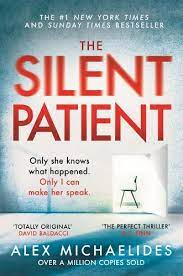
The past decade or so has seen a plethora of psychological thrillers. Some are excellent, many are a bit samey, and some are hopelessly contrived. Invariably the publishers promise a 'killer twist'; sometimes the author delivers, sometimes the twist proves all too predictable. At its best, however, this kind of writing can be truly dazzling. A very good example is The Silent Patient by Alex Michaelides, which in my opinion deserves the superlatives that reviewers have flung at it. It's a first novel, amazingly, though the author is an experienced screenwriter, and he certainly writes in a vivid yet (sometimes deceptively) straightforward way.
A gimmick associated with this type of story is the tag-line. In this case, it's: 'Only she knows what happened. Only I can make her speak.' This sums up a gripping premise. Six years ago, the artist Alicia Berenson shot her husband, a charismatic fashion photographer called Gabriel, in the head - five times. Since then, she hasn't spoken a single word. The narrator, a forensic psychotherapist, is determined to get her to talk.
Michaelides has spoken in published interviews about his admiration for Agatha Christie and although this story is very different from anything written by the Queen of Crime, you can trace her influence in the way he juggles his story ingredients as well as in the skill with which he directs the reader's attention away from what has really happened, usually by deploying some artfully conceived red herrings.
I don't want to say too much about the way in which the story develops, because it would be a shame to spoil some of the surprises. Suffice to say that I read the book on a train journey that was excessively protracted thanks to a malign combination of engineering works and staff shortages. Thanks to Michaelides, a trip that could have been a miserable experience proved very rewarding. An excellent thriller, strongly recommended.
November 25, 2022
Forgotten Book - Murder of Me
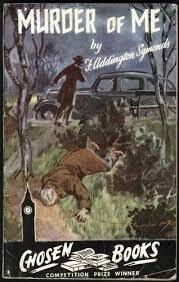
Xavier Lechard's blog At the Villa Rose is perhaps the longest-running solo-author crime fiction blog that I can recall. It's also a blog with a pleasing and distinctive flavour. I've been reading Xavier's thoughts with interest for many years and occasionally his ideas - even those I don't entirely agree with - spark some of my own thinking, whether about particular titles or aspects of the Golden . So when he discussed his enthusiasm for Murder of Me by F. Addington Symonds (in a comment on a post on this blog about the comparable Guy Cullingford novel Post Mortem) I sat up and took notice.
Now I've had a chance to read the book for myself and form my own opinion. The first thing to say is that Xavier is absolutely right: Murder of Me is unusual. Genuinely unusual. Published in 1946, it pre-dates Post Mortem and it has some lovely trimmings, including footnotes which reference books such as The Murder of Roger Ackroyd and Howard Haycraft's Murder for Pleasure. Yes, at times we venture into metafiction.
Murder of Me is not an easy novel to discuss without spoilers, so I'll try to choose my words with care. In essence, it's a story told from the point of view of a murder victim. This is James Mortimer Vidal, a rather disagreeable chap who gives one of his daughters the unenviable task of solving the mystery. There are plot twists and touches of ingenuity. It's extremely difficult to be truly original, but Symonds makes a good stab at it.
The novel does, however, have weaknesses. Many of these stem from the fact that Vidal is unpleasant and I found it hard to warm to any of the other characters. The puzzle, too, wasn't as gripping as I'd hoped. There's something rather dry about the prose, despite Symonds' cleverness. I wasn't too surprised to learn that he spent a lot of time as a writer for pulpy magazines. So I wasn't totally bowled over by the book. It does, however, rank as an extremely intriguing curiosity and I'm very glad that Xavier drew it to my attention.
November 23, 2022
Trance - 2013 film review
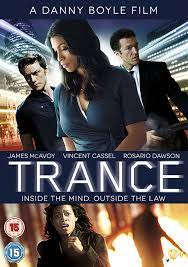
Trance is a Danny Boyle film, and is as visually appealing as you might expect with this director. It's an art heist movie with a difference, and it begins with a gripping ten-minute sequence before the opening credits, with the theft of a $25 million Goya painting from an auction house. The story is introduced by Simon (James McAvoy), who works in the auction house and who seems to make a brave but unavailing attempt to stop the thieves, and is injured in the process. It's no great surprise to learn that the crime was an inside job and that Simon was involved, but from that point the story becomes quite unpredictable.
The unpredictability, unfortunately, is a large part of the problem with the film. It's based on a script which Joe Ahearne sent to Boyle many years before the film was made. Boyle involved John Hodge as a script doctor, but I don't think enough doctoring took place. Whilst we're not meant to take the story too seriously, a film of this kind does, I think, need to have some touches of plausibility. And that's in very short supply.
The central idea is that Simon has hidden the painting, but because of his injuries, can't remember what he did with it. Torturing him doesn't work, so his fellow thieves (led by Vincent Cassel) agree to have him undergo hypnosis so that, in a trance, he will reveal what happened to the painting. The hypnotherapist chosen is the beautiful Rosario Dawson and again it comes as no surprise to learn that she has some previous connection with Simon - or that she is destined to become a femme fatale.
While the villains try to locate the painting, the auction house makes no apparent effort to check on whether Simon was involved in the crime. This seems to me to be even more of a weakness than one of the criticisms made by Peter Bradshaw, giving the movie a poor reviewin the Guardian, when he points out that there's no indication as to how the baddies will sell the painting. Dawson is very watchable, even if her character isn't credible, but on the whole this is a film that doesn't make the most of its considerable potential.
November 21, 2022
Robbery - 1967 film review

I watched Robbery in the cinema as a boy, not too long after its original release, and I really enjoyed it. I enjoyed it all over again in 2009 and recorded my enthusiasm on this blog. Watching for a third time, I remain impressed. Peter Yates, the director, is much better known for films such as Bullitt, famous for its car chase in San Francisco, but the car chase in central London at the start of Robbery is itself excellent, and it paves the way for an entertaining fictionalisation of the real life Great Train Robbery.
The casting is clever, because to some extent it confounds expectations. The gang leader, Paul Clifton, is played by Stanley Baker, who made his name as a tough cop. Other actors to play gang members include Barry Foster (famed as Van der Valk), George Sewell (of Special Branch) and the charismatic Frank Finlay . Conversely, the lead cop is James Booth, who you might think of as more likely to play a crafty villain. His boss, Glynn Edwards, was equally adept at playing baddies. So perhaps we're more inclined to hope, secretly, that the heist will succeed.
The soundtrack was written by Johnny Keating, who indulges in a Bacharachesque theme for a climactic scene at the gang's hideout, while the screenplay was co-written by Edward Boyd, an interesting writer who collaborated with Bill Knox on the novelisation of Boyd's TV series The View from Daniel Pike (Bill's widow told me that he did all the writing, based on Boyd's ideas).
Heist films tend to be predictable, but this one is genuinely gripping, perhaps because the case on which it was based was so remarkable. Credit for this goes to Yates, who does a great job, along with the wonderful cast (which also includes Joanna Pettett, whose career ended far too soon). Definitely recommended.
November 18, 2022
Forgotten Book - A Shilling for Candles
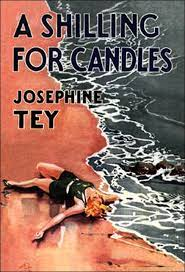
A Shilling for Candles, published in 1936, was Josephine Tey's second detective novel to feature Inspector Alan Grant. I've mentioned it a couple of times on this blog, in connection with Nicola Upson's novel Fear in the Sunlight, and also as the basis for Alfred Hitchcock's film Young and Innocent, which as I said in is very different from the book - even the murderer and motive are changed!
I first read this novel many, many years ago. I 'm a Tey fan, but I was disappointed with it overall. I think that was because she didn't, in my opinion, pay enough attention to characterising the killer or making the motive credible - and this helps to explain why Hitchcock made so many changes. It's certainly not a 'fair play' novel. However, I decided to give it another try and consider the story in part from a technical perspective - why did Tey make the choices she did, and which of them worked?
The fact that I knew what to expect didn't lessen my enjoyment and the first thing to say is that Tey, as always, writes very well and engagingly. The opening scene, where a coastguard discovers a body on a beach, is very well done. The 'man on the run' aspect of the story, which Hitchcock focused on, is also quite good. The title is intriguing and it refers to a mocking bequest in Christine's will. However, this part of the story rather fizzles out as Tey tries to draw the various strands together.
The central problem, I think, is that although she came up with some wonderful story ingredients, she didn't think hard enough about how to integrate them into a satisfactory whole. Probably she was writing in a rush, and wanting to get back to her work in the theatre. I suspect she became worried about the thinness of the motivation and as a result decided to portray the killer, in the closing pages, as deranged. I feel that, despite an element of outlandishness, more could have been done to make this crucial part of the story plausible. But the book is not only worth reading - I was very happy to have read it for a second time, despite my reservations.
November 16, 2022
Who Killed the Cat? - 1966 film review
The name of Arnold Ridley is still fondly remembered because of his charming portrayal of Private Godfrey in the long-running comedy series Dad's Army. Less often recalled is his work as a playwright. His most famous play was The Ghost Train, but he was quite prolific, and adapted Christie's Peril at End House as well as writing thrillers of his own. In 1956 he wrote Tabitha, in collaboration with Mary Catchcart Borer, another prolific author. This play was filmed ten years later as Who Killed the Cat?
The film was directed by Montgomery Tully, who co-wrote the screenplay with Maurice J. Wilson, and although it doesn't seem particularly 'stagey', it does seem more redolent of the Fifties than the Swinging Sixties. Blow Up it ain't. It is, however, in its modest way, quite a distinctive and enjoyable piece of light entertainment.
The story begins with the reading of a will, that of the late husband of Eleanor Trellington (Vanda Godsell). It's pretty clear that the deceased had grown weary of Eleanor, his second wife, while she is bored with the three elderly ladies who lodge with her, and at odds with her teenage step-daughter, Mary (Natasha Payne). Eleanor behaves unpleasantly to all and sundry, including Mary's young admirer, who works for a local jeweller (played by Mervyn Johns). When Mary buys poison from the local chemist, the scene is set for dark deeds.
The story rattles along at a respectable pace, and the three old ladies perform with gusto. A police inspector played by Conrad Phillips comes on to the scene, while there is a small part for Joan Sanderson. It is a notch above standard British B-movie fare, an unpretentious film that doesn't outstay its welcome. Tabitha, by the way is the name of a cat. As the title of the film suggests, not a good idea to get too attached to her...



